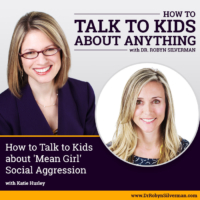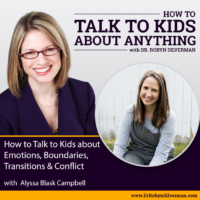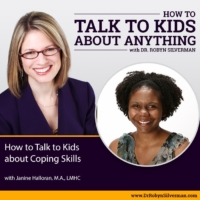Podcast: Play in new window | Download
Subscribe: Apple Podcasts | RSS | More
How to Talk to Kids about Depression, Conflict & Coping with Katie Hurley
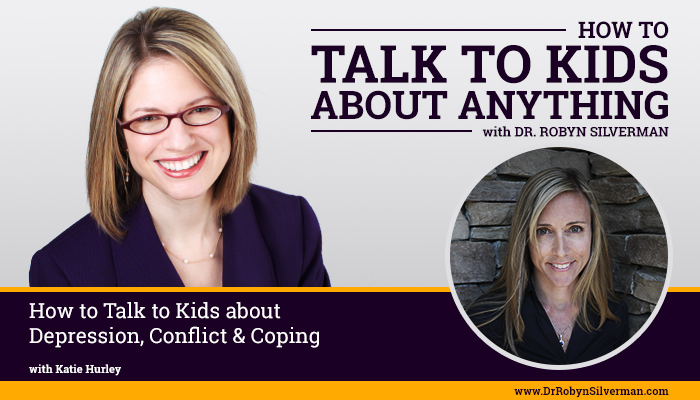
This podcast will focus on kids who are coping with depression—but also teens who are going through a hard time or stressful periods of time. Stress levels are rising among kids and they need to tools and guidance to cope with the big feelings that are tied up with stress. Katie Hurley and Dr. Robyn Silverman discuss how to talk to kids about depression, how we can change our moods, the red flags that might indicate a clinical problem and how to deal with conflict. Teens are motivated to help themselves and this podcast, as well as Katie Hurley’s new depression workbook, has many takeaways that will allow teenagers to do just that—but also know how to ask for help when necessary.
Special guest: Katie Hurley
According to the US Department of Health and Human Services, approximately one out of five teens has a mental health disorder, 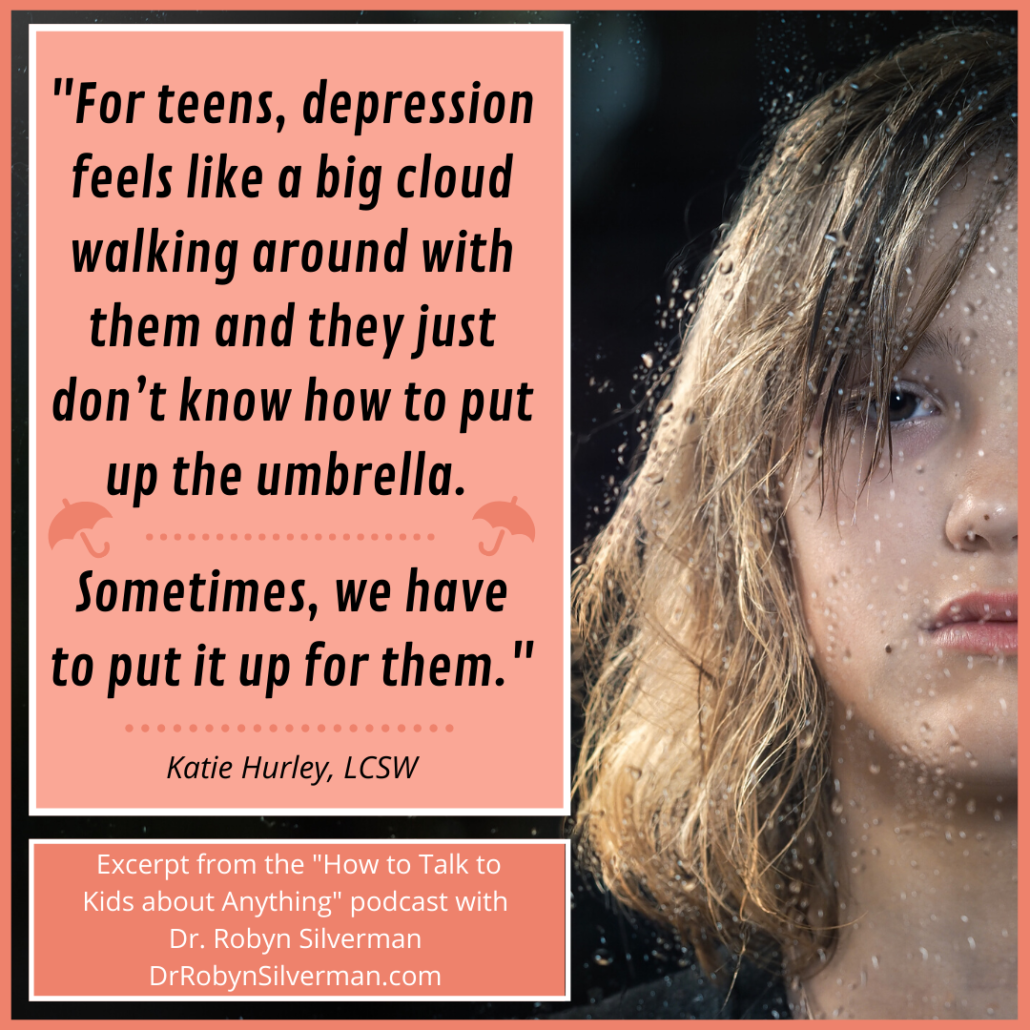 diagnosable by clinical methods, and nearly one-third show symptoms of depression. Now you might be thinking- well, many teens seem depressed to me, their moods and their emotions are all over the place! Stress is overwhelming! Yes, that can be true- symptoms of depression in adolescents aren’t always easy to identify because they often appear as normal adolescent behavior. But if we keep an eye open for consistent depressed behavior and indicators like, fatigue, changes in sleep patterns, changes in eating patterns, social withdrawal, and/or anger- these can serve as early warning signs that can allow us to get help for our teens as depression is absolutely treatable but NOT fixable on its own. Teens who have depression need therapy, support at home and yes, some also need medication. There’s no quick fix and thankfully, we have Katie Hurley here to explain how we know if our child needs help, what we and our teens can do at home to assist and what exercises and tools we can use to improve mood, self-esteem and motivation.
diagnosable by clinical methods, and nearly one-third show symptoms of depression. Now you might be thinking- well, many teens seem depressed to me, their moods and their emotions are all over the place! Stress is overwhelming! Yes, that can be true- symptoms of depression in adolescents aren’t always easy to identify because they often appear as normal adolescent behavior. But if we keep an eye open for consistent depressed behavior and indicators like, fatigue, changes in sleep patterns, changes in eating patterns, social withdrawal, and/or anger- these can serve as early warning signs that can allow us to get help for our teens as depression is absolutely treatable but NOT fixable on its own. Teens who have depression need therapy, support at home and yes, some also need medication. There’s no quick fix and thankfully, we have Katie Hurley here to explain how we know if our child needs help, what we and our teens can do at home to assist and what exercises and tools we can use to improve mood, self-esteem and motivation.
Katie Hurley, LCSW, is a child and adolescent psychotherapist, parenting expert, and writer. She is the founder of “Girls Can!” empowerment groups for girls between ages 5-11. Hurley is the author of The Happy Kid Handbook” “No More Mean Girls,” (both subjects we have interviewed Katie on previously on How to Talk to Kids about Anything) and her new workbook, The Depression Workbook for Teens, which is the #1 new release on Amazon for Teen and Young Adult Self Esteem and Self Reliance Issues. Her work can be found in The Washington Post, PBS Parents, and US News and World Report, among other places. She practices psychotherapy in the South Bay area of Los Angeles and earned her BA in psychology and women’s studies from Boston College and her MSW from the University of Pennsylvania. She splits her time between California and Connecticut with her husband and two children.
The podcast provides:
- A discussion of depression and other big feelings like affect self-esteem and feeling good about yourself.
- Red flags that might indicate that our children are experiencing depression.
- How to talk to kids about depression
- What kids can do to help elevate their mood (eating, sleeping, activities)
- How conflict affects depression and our feelings around self-esteem.
- Open the door, listen, then talk to them about their brains later when the door is open more than a crack.
Important Messages:
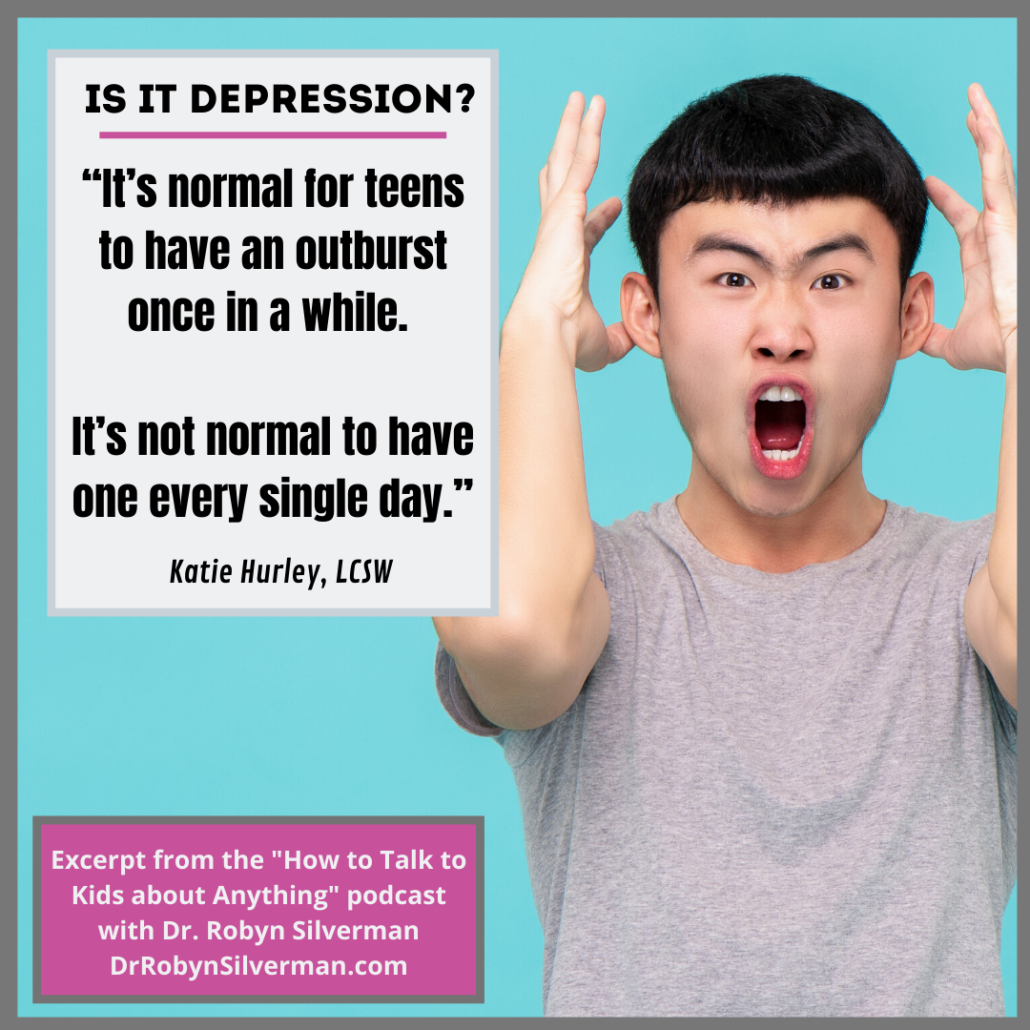 Lots of stressors in the lives of teens. They are trying to improve the lives of others and themselves- we need to just give them some guidance and they can run with it!
Lots of stressors in the lives of teens. They are trying to improve the lives of others and themselves- we need to just give them some guidance and they can run with it!- Lots of normal ups and downs in a teen’s life but one of the hallmarks of clinical depression is that it lasts for 2 weeks or more.
- Depression doesn’t always look sad- it can look like anger and blow ups and irritation. Look for irritability that crops up over time and daily!
- Normal to put self in room every once in a while- if isolated and not around their friends anymore- that’s a problem.
- We often walk on eggshells with our teens since we don’t know how they’ll react- normalize the depression and depressive feelings.
- Script: “I found this great resource and you can use it or not- but it seems to me, and I might be totally wrong, that you seem a little lonely lately, that you don’t want to be with your friends, that you seem a little different. I’m here for you, you can flip through this resource or not, but I wanted to know that I’m thinking of you and if something’s going on, I’m here to listen.”
- Watch we come at our children- after school they are exhausted and saturated!
- How does our food affect our brains and our foods? Talk to kids about that! Limit processed foods and premade foods. Balance the food that is not homemade. Nuts, fruits, veggies, omega 3s, seeds, avocado- make a healthy habit. How do we find the time?
- Meal prep. Healthy foods.
- Sleep is essential for the teen brain. They need 8-9 hours per night. Most are getting 6-7. But the teen brain wants to stay up later and sleep later- but this doesn’t work with the school schedule. Then they over sleep on the weekends- and this isn’t good for their circadian rhythms.
- Get technology out of the bedroom.
- Meditation and yoga can help before bed.
- Rigid routine on sleep for kids before teen years- then it goes haywire. Then back to rigid as adults.
- Empower teenagers to create the system that works for them!
- We often harp on the things we are scared of- like technology. Teens need to help create their own systems though.
- Youtube videos- teens often go down the rabbit hole, watching one video after the next and before they know it it’s 3am.
- Key for coping with conflict- communication.
- Learn how to deal with conflict- take it offline. Must be done face to face.
- John Duffy: “Snapchat is the road rage of social media.” People use stories to call out fights. Heart to hearts over texts- share screen shots, snippets, in a certain way to make it look one way or another.
- John Mayer: “When you own the information you can change it all you want.” So they change it to fit the narrative they are trying to portray.
- We’ve got to get away from relying on tech to solve our problems. Teens stuck on it because it’s quick and easy. They get into
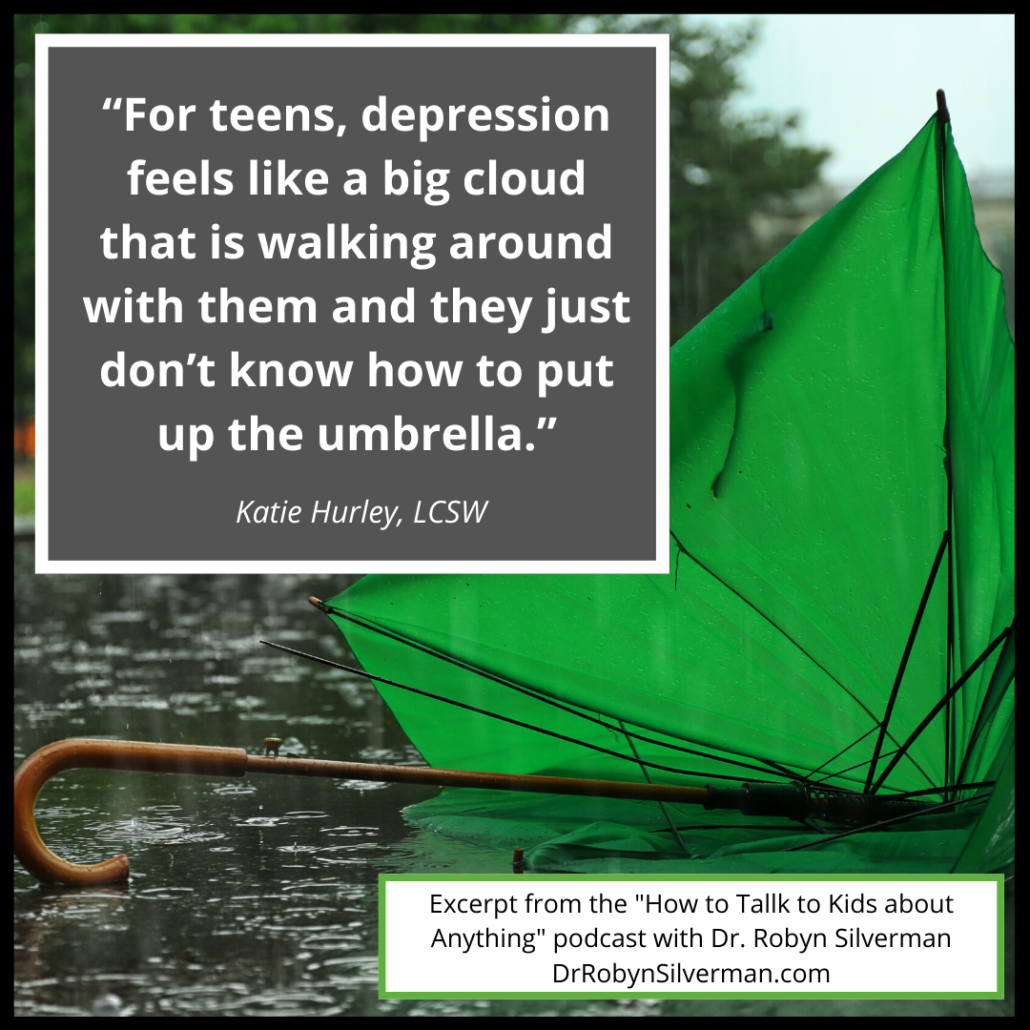 these chats and they don’t know how to get out of them. Conflicts get out of control quickly.
these chats and they don’t know how to get out of them. Conflicts get out of control quickly. - Steps for dealing with conflict: Step 1: Take it offline. Step 2: Use “I statements.” “When you shared that screenshot, I felt embarrassed. I wish you didn’t share it. Why did you share it?”
- Teens often not told how to deal with conflict. Plus, they have this and pressure of needing to look like the superstar. When something goes wrong, they are looking for someone to blame. Blame is useless. Be accountable.
- Parents can role play. What was the conflict? Go back to the beginning. First time, you be you and I’ll be your friend. The second time we’ll switch roles so we can have empathy and perspective for the other person. We’ll go step by step. You can also go back and say what you wish you had said.
- Remember George from Seinfeld? He talks about all these come back lines of what he wished he said in a certain circumstance.
- Hard in the moment- clear thoughts.
- Being human- you can go back and apologize. You might not get forgiveness right away. But may help in the future. We can try to do better next time. Can change how you sit in your own body.
- When people come to us for forgiveness. It doesn’t mean “everything is fine now.” It’s giving yourself permission to move on and that it doesn’t have to take over your brain space.
- Many teens will take advice from others but not from their parents—individuation. Good to have key adults in their lives who you can trust!
- Gratitude- calm, happiness. So good for your health. (In US, very grateful in November but not the other 11 months!)
- Journal- allows you to think about gratitude. Best and worst of the day. Worst- so that it no longer has to take up brain space. Best- for gratitude. Breathe deeply. What today makes you grateful? It doesn’t need to be big things!
- What’s your tag line. “I got this.” “I can handle whatever comes my way.” Make it your thing!
- Practical/realistic thoughts vs negative thoughts. The negative thoughts in our heads can become our truth. Teens tend to zoom in on small things that happen. Negative thought loop. Can’t always go to the positive. Let’s just be realistic. Doesn’t have to be sunshine and positive.
- Reframe: Bombing test. Own that negative thought- “I’m failing English.” Yes, own it. You bombed the test! Zoom out. Let’s look at the full arc- are you really failing in English? Or did you just struggle with this test and you can go in for extra help and see what you can do? Instead of “I failed this test, my parents are going to be so mad at me, I’m going to be grounded, this is a complete disaster” go to the realistic thought. “I’ve been doing well in English up to this point. I bombed this one test but I can get extra help.”
- The one thing I really want people to know about depression and teens is- depression feels very overwhelming so it makes it difficult to describe and it makes it difficult for teens to tell you how they are feeling. It feels like a big cloud that’s walking around with them and they just don’t know how to put up the umbrella.
- Parents: You don’t need to be scared of depression. It doesn’t need to influence their lives forever. This is treatable.
- Suicide is preventable.
- Helicopter parents- constantly told to back off and leave them be. Message to teens is that they have to figure this out themselves. But everyone needs help sometimes. Parents- don’t be afraid to help your kids when they are in need.
- If you think your child is showing signs of depression, please call your child’s primary care physician. You can also get help from the school if you have someone on staff as a counselor.
Notable Quotables:
- “Teens today are really motivated, really smart, they want to make a difference and they want to make healthy changes in
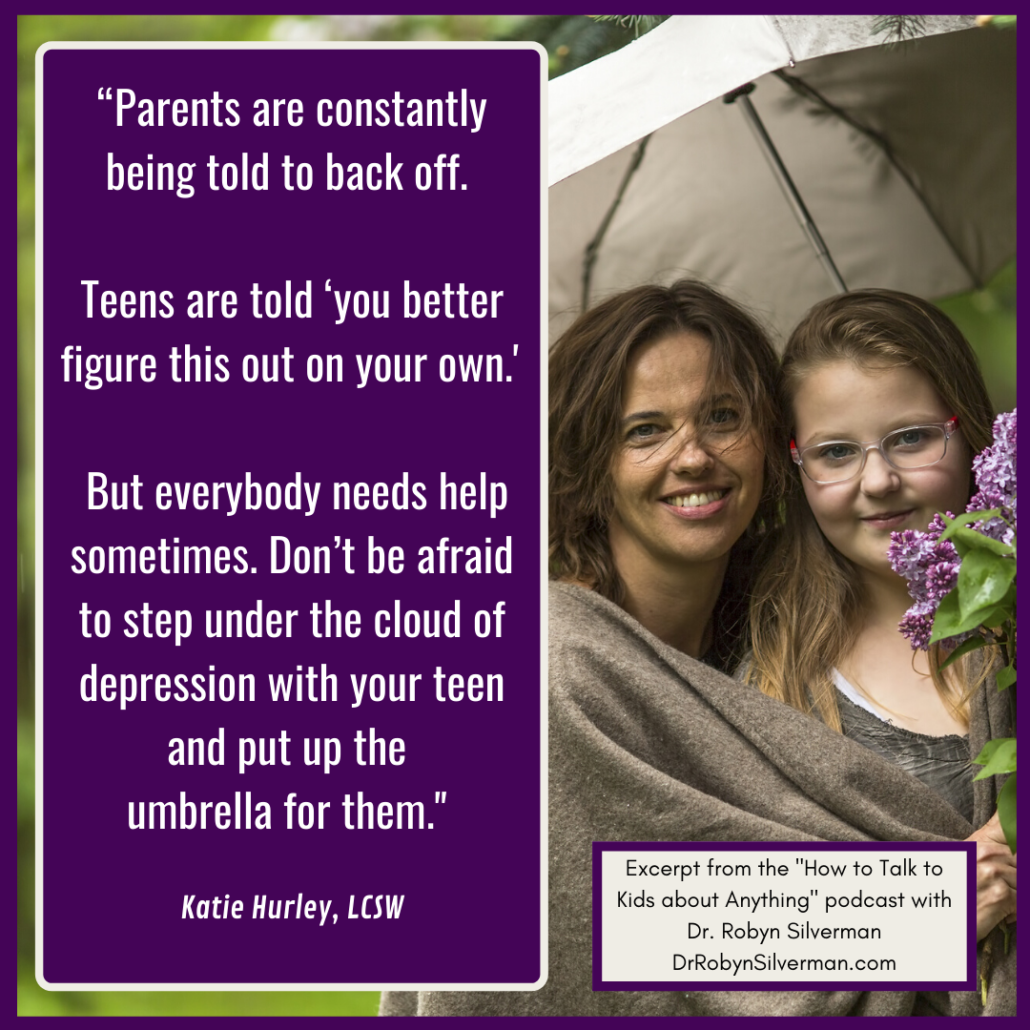 their lives. They are fighting for big things like the environment and gun sense and women’s rights and they are fighting for small things how they can get their lives together and get to school each day and cope with all the stress they are dealing with—and they just need the right guidance. With the right guidance, we can step back and let them take the wheel and they really learn how to help themselves.”
their lives. They are fighting for big things like the environment and gun sense and women’s rights and they are fighting for small things how they can get their lives together and get to school each day and cope with all the stress they are dealing with—and they just need the right guidance. With the right guidance, we can step back and let them take the wheel and they really learn how to help themselves.” - “The teen years are fraught with up and downs. That’s normal. Hormones and growth and change and brain development- a whole big giant soup of stuff happening inside their brains on any given day. What’s just a bad day and what’s actually a problem? One of the hallmarks of clinical depression is that it lasts for 2 weeks or more.”
- (Is it depression?) “It’s normal for teens to have an outburst once in a while. It’s not normal to have one every single day.”
- “Parents; do a gut check. If something seems like something’s not quite right, you’re probably correct. It’s best to get your child assessed than to wait on it and see what happens.”
- “Normalize depression. We have to be better listeners than talkers. Parents tend to talk a lot and have a lot of answers.”
- “Drop everything and talk.”
- “The more we eat healthy foods, the more we crave healthy foods. The problem is we are all busy so we get into the habit of grabbing on the go and eating what we can in the car from here to there. Typically, those foods are not as healthy. I mean, it’s really hard to eat a quinoa bowl while you’re driving a car and putting on your cleats.”
- “Sleep is essential for the teenage brain and we also know that most teenagers aren’t getting enough sleep. Teens need about 8 to 9 hours per night and most are getting about 6 to 7. That will tank their moods and ramp up anxiety. That’s a terrible combination for teenagers who are already coping with stress.”
- “With teenagers, we need to empower them to create the system that works for them. They don’t like to be told what to do- they are told what to do all day every day. Sit down with them and have them tell you what they think will work for them and what they need to change. What do they need to do to help themselves before bed?”
- “Kids have got to learn how to deal with conflict face-to-face. They’ve got to take it offline.”
- “We’ve got to stop relying on technology to solve problems. It’s great for checking in, it’s great for funny memes, it’s great for a laugh or scheduling a coffee date or a podcast. It’s not great for solving a problem.”
- “Even if something is 98% not your fault, own your 2%.”
- “The great thing about being human is we can go back and say; ‘I’m sorry that I said that…and I’m sorry what I said hurt you.”
- “Forgiveness is leaving the door open a tiny crack but letting go of it so you are not burdened with it.”
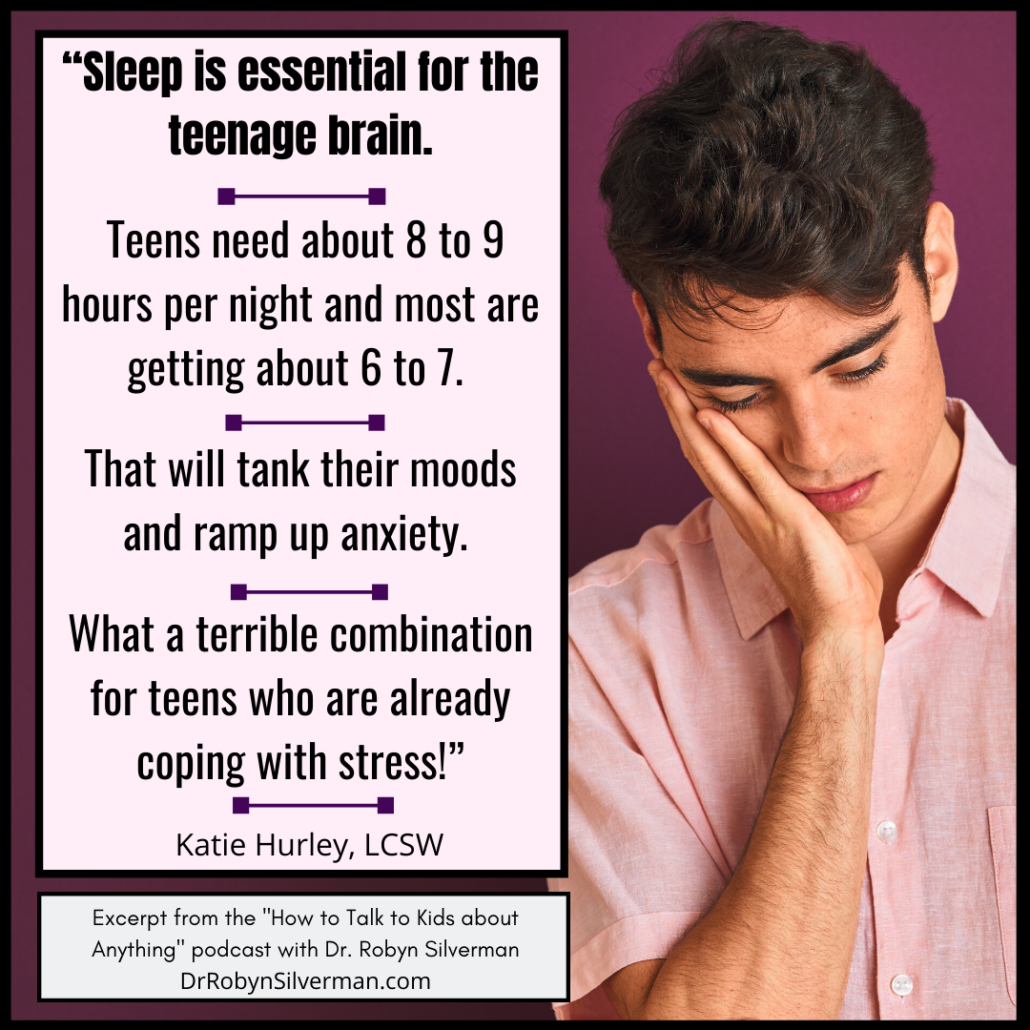
- “We have to teach young people that they can be grateful for the little things. It doesn’t always need to be for big things! Those little small moments add up to big feelings of gratitude over time.”
- “For teens, depression feels like a big cloud that is walking around with them and they just don’t know how to put up the umbrella.”
- “Because of media coverage of things like ‘helicopter parenting,’ we are constantly being told to back off and leave the kids be and let them figure this out. The message the teens are getting is ‘you better figure this out on your own.’ But everybody needs help sometimes. So don’t be afraid to step under the cloud of depression with your teen and put up the umbrella for them. Eventually they’ll learn how to do it alone but right now they can’t and they do need you and that’s okay. This is a time when you should step in and hold it up for them.”
For teens, depression feels like a big cloud that is walking around with them and they just don’t know how to put up the umbrella, says @KatiefHurley on #talktokids podcast. Sometimes, we have to put it up for them.
Click To Tweet
Resources:
-
Twitter: @KatieFHurley
-
Instagram: @KatiefHurley
-
Website: PracticalKatie.com
Social Media for Dr. Robyn:
- facebook.com/DrRobynSilverman
- twitter.com/DrRobyn
- instagram.com/DrRobynSilverman
- facebook.com/HowToTalkToKidsaboutAnything
The post How to Talk to Kids about Depression, Conflict & Coping with Katie Hurley – Rerelease appeared first on drrobynsilverman.com.

